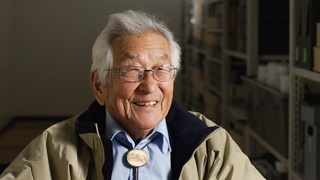Interviews
Disadvantages of looking Japanese
All the verbal etiquette, the mannerisms in Japan, which is a lot compared to different countries—I had no idea what they were. I didn’t know I shouldn’t drink before the elders. You know, we sit down with some company president, and we get our drinks. He doesn’t get his drink yet, and I’m sipping mine. I didn’t know I couldn’t do that. Before you eat, “itadaki-masu.” After you eat, “Gochisou-sama.” I didn’t know those words.
The problem with that was me looking Japanese. I was expected to know all that. If I had blue eyes, blond hair, and I didn’t do that, “This foreigner, this gaijin doesn’t know the mannerisms here.” Because I looked so Japanese, I was portrayed as a rude Japanese, in a way, for the people who didn’t know who I was.
You see me at a restaurant with a president that really doesn’t know me that much. I’m sitting with the president of the English school, just coming with him. So I’m not really introduced like that. And I’m there just sitting down drinking my juice, and he doesn’t even have his. It’s not a good impression. So I had lot of problems with that—everyone thinking that I knew the language, everyone thinking that I should speak.
I got stopped once on the rode with police, and he asked me for my license in Japanese, which I didn’t understand that time because I just came [here]. I looked and said, “I don’t know what you’re talking about.” I’m giving him the registration, which usually people ask first the registration. And he’s asking for my license. And you know, I told him in my broken Japanese that “I don’t understand what you’re saying. I’m not Japanese.” And he got pissed at me, and it got really bad that situation. You know, he actually had to apologize later because I was a foreigner. I really didn’t understand what he was saying.
So there’s a lot of prejudice in Japan to foreigners. And lo and behold, I was considered a foreigner when I got here.
Date: October 14, 2003
Location: Saitama, Japan
Interviewer: Art Nomura
Contributed by: Art Nomura, Finding Home.
Explore More Videos







Postwar school-life
(b. 1930) Half Japanese and grew up in both Japan and the United States.

On Challenging Institutions
(1938-2020) Japanese American attorney and civil rights activist

Pop and Balls
(1938-2020) Japanese American attorney and civil rights activist

Re-examining Identity
(1941-2018) Japanese Canadian photojournalist and activist



Conflicted about immigrating to America (Japanese)
(b. 1925) War bride

Defining "Nikkei"
(1941-2018) Japanese Canadian photojournalist and activist

Feeling prejudice while looking for jobs
(1919 - 2015) Nisei who served in World War II with the 442nd Regimental Combat Team
